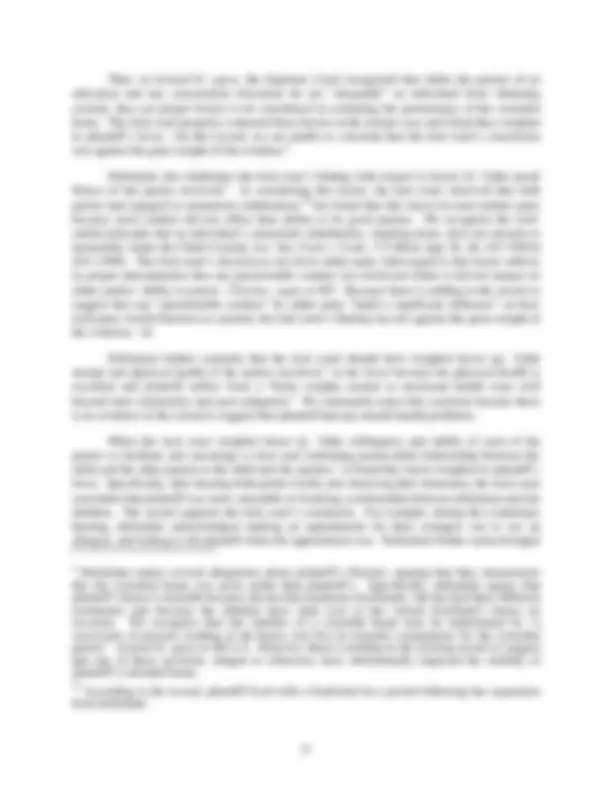





Study with the several resources on Docsity

Earn points by helping other students or get them with a premium plan


Prepare for your exams
Study with the several resources on Docsity

Earn points to download
Earn points by helping other students or get them with a premium plan
Community
Ask the community for help and clear up your study doubts
Discover the best universities in your country according to Docsity users
Free resources
Download our free guides on studying techniques, anxiety management strategies, and thesis advice from Docsity tutors
A custody appeal case where the defendant challenges the trial court's decision granting the plaintiff sole physical custody of their minor children after the defendant moved to another city. the legal framework for modifying custody orders and the trial court's findings of fact and conclusions regarding the best interest of the child. Factors such as love and guidance, provision of basic needs, stability, permanence of the home, moral fitness, and willingness to facilitate parent-child relationships are considered.
Typology: Study notes
1 / 7

This page cannot be seen from the preview
Don't miss anything!




July 20, 2001 Plaintiff-Appellee,
v No. 230682 Chippewa Circuit Court JAMES DREW SUGGITT, LC No. 98-003887-DM
Defendant-Appellant.
Before: Neff, P.J., and O’Connell and R. J. Danhof*, JJ.
PER CURIAM.
Defendant appeals as of right from the trial court’s October 13, 2000 custody order granting plaintiff sole physical custody of the parties’ minor children. We affirm.
Following their July 30, 1994 marriage, the parties resided in Sault Ste. Marie. Their union produced two children, Isaac Ross and Bryce Bailey. According to the record, the parties separated in December 1998. Pursuant to the September 9, 1999^1 consent judgment of divorce, the parties shared joint legal and physical custody of the two boys. Specifically, the parties alternated sharing physical custody of the children on a weekly basis. After defendant moved to Mount Pleasant in the spring of 2000, both parties filed petitions seeking sole physical custody of the children.^2 Following an October 9, 2000 evidentiary hearing, the trial court awarded plaintiff sole physical custody.
On appeal, defendant contends that the trial court erroneously found defendant’s intrastate move from Sault Ste. Marie to Mount Pleasant to be a change in circumstances warranting a modification of the prior custody order. Whether a change in circumstances exists to warrant modification of a prior custody order is essentially a factual determination. We review a trial
(^1) Although the consent divorce judgment is dated July 21, 1999, it was not entered by the trial
court until September 9, 1999 for reasons unclear from the record. (^2) According to the record, defendant petitioned for a change in custody on July 10, 2000, and
plaintiff filed a similar petition on August 28, 2000.
court’s findings of fact in a child custody proceeding to determine if they are contrary to the great weight of the evidence. Fletcher v Fletcher , 447 Mich 871, 877-878; 526 NW2d 889 (1994); Phillips v Jordan , 241 Mich App 17, 20; 614 NW2d 183 (2000). We will affirm a trial court’s factual determinations in a custody proceeding unless the record evidence “clearly preponderates in the opposite direction.” Jordan, supra at 20.
MCL 722.27(1)(c) allows a trial court to modify an existing custody order “for proper cause shown or because of a change in circumstances.” Before modifying an existing custody order, a trial court must determine whether an established custodial environment exists. MCL 722.27(1)(c).^3 If the trial court concludes that an established custodial environment exists, a custody order may not be modified unless the court is persuaded by “clear and convincing evidence [that a modification] is in the best interest of the child.” MCL 722.27(1)(c); see also Rossow v Aranda , 206 Mich App 456, 458; 522 NW2d 874 (1994).
We recognize that a custodial parent’s intrastate move does not amount to proper cause or a change in circumstances to the extent that a trial court may modify an existing custody order. Dehring v Dehring , 220 Mich App 163, 166; 559 NW2d 59 (1996). However, a review of the trial court’s ruling indicates that its decision to revisit the statutory best interests factors was not based solely on defendant’s intrastate move. Rather, the trial court found that Isaac’s obtaining school age, and the impossibility of maintaining the current custody arrangement since defendant moved to Mount Pleasant, was a change in circumstance that warranted a modification of the existing custody arrangement.^4 Thus, the present case is factually distinguishable from Dehring, supra.^5
A review of the record supports the trial court’s conclusion. At the time of the October 2000 custody hearing, Isaac was five years old and Bryce was three years old. During the custody hearing, plaintiff testified that she had enrolled Isaac in kindergarten in April 2000, and that he began attending school in September 2000. Plaintiff further testified that in the time leading to the custody hearing, Isaac could only attend school every other week because of the existing custody arrangement. On this record, we are unable to conclude that the trial court’s factual determination was against the great weight of the evidence.
Defendant’s remaining issues on appeal relate to the trial court’s consideration of the statutory best interests factors. See MCL 722.23. Specifically, defendant challenges the court’s findings of fact with respect to factors (b), (c), (d), (e), (f), (g), (j), and (l). As mentioned previously, we review a trial court’s factual determinations to discern whether they are against the great weight of the evidence, and will affirm them unless the evidence clearly preponderates
(^3) In the instant case the trial court concluded that an established custodial environment existed
with both parties. (^4) During the evidentiary hearing, defendant’s attorney acknowledged that Isaac attending school
was a change in circumstances warranting a modification in custody. (^5) In Dehring, supra , the noncustodial parent petitioned for a change in custody after the plaintiff
decided to move with the children from Alpena to the Kalamazoo area so that she could attend college. Dehring, supra at 164.
In considering factor (e), “[t]he permanence, as a family unit, of the existing or proposed custodial home or homes,” the trial court found that this factor weighed in favor of plaintiff. “The focus of factor e is the child’s prospect for a stable family environment.” Ireland v Smith , 451 Mich 457, 465; 547 NW2d 686 (1996) ( Ireland II ). In our opinion, a review of the record evidence supports the trial court’s finding on this factor. During the custody hearing, plaintiff testified that she had worked at the Sault Ste. Marie Employee’s Credit Union for five years and that she is afforded great flexibility in her work schedule to care for the children.^6 Plaintiff also testified that she had been living at the same residence since April 1999, and that she shared the home with a female roommate who was also a single mother of a young child.
The trial court also observed that defendant had recently moved to Mount Pleasant to attend school,^7 he was sharing a home he owned with his then-fiancee Heather Pieri, and that the two did not have immediate plans to marry.^8 Defendant testified that he planned to live in Mount Pleasant until he finished his education, which he estimated could take up to four years to complete, and was uncertain where he would ultimately settle. While attending school, defendant was employed by the Department of Corrections, working the night shift from 11: p.m. until 7:00 a.m. During trial, defendant testified that when not attending classes, he was at home during the day with the children, and that he performed various educational activities with them.
On appeal, defendant claims that the trial court erred in considering his pursuit of educational goals as a factor that suggested his custodial home was not stable. In Ireland II, our Supreme Court observed that an individual’s pursuit of educational goals “do[es] not disqualify [the individual] for custody.” Id. at 465. However, the Court went on to observe that the relocation and adjustments associated with the pursuit of education are factors that may be taken into account by a trial court when weighing factor e. Id.
While a child can benefit from reasonable mobility and a degree of parental flexibility regarding residence, the Legislature has determined that “permanence, as a family unit, of the existing or proposed custodial home or homes” is a value to be given weight in the custodial environment. [ Id. ]
(^6) Plaintiff testified that she works thirty-five hours a week at the credit union. Plaintiff also
presented the testimony of Garry Bennett, a member of the credit union’s board of directors. He also testified that plaintiff had been working for the credit union for five years, with an excellent work performance history. Bennett also indicated that plaintiff had very flexible working hours because the credit union is small and only employs two people. (^7) According to the record, defendant was studying to become a guidance counselor.
(^8) Both defendant and Pieri testified that they did not have any immediate plans to marry.
However, according to a copy of the marriage certificate appended to defendant’s brief on appeal, defendant married Pieri on November 11, 2000, one month after the evidentiary hearing. We decline to consider the fact that defendant is now married in evaluating the trial court’s finding of fact with regard to factor e. See Krohn v Sedgwick James of Michigan, Inc , 244 Mich App 289, 293 n 3; 624 NW2d 212 (2001).
Thus, in Ireland II, supra , the Supreme Court recognized that while the pursuit of an education and any concomitant relocation do not “disqualify” an individual from obtaining custody, they are proper factors to be considered in evaluating the permanency of the custodial home. The trial court properly evaluated these factors in the instant case and found they weighed in plaintiff’s favor. On this record, we are unable to conclude that the trial court’s conclusion was against the great weight of the evidence.^9
Defendant also challenges the trial court’s finding with respect to factor (f), “[t]he moral fitness of the parties involved.” In considering this factor, the trial court observed that both parties had engaged in unmarried cohabitation,^10 but found that this factor favored neither party because such conduct did not affect their ability to be good parents. We recognize the well- settled principle that an individual’s unmarried cohabitation, standing alone, does not amount to immorality under the Child Custody Act. See Truitt v Truitt , 172 Mich App 38, 46; 431 NW2d 454 (1988). The trial court’s decision to not favor either party with regard to this factor reflects its proper determination that any questionable conduct was irrelevant where it did not impact on either parties’ ability to parent. Fletcher, supra at 887. Because there is nothing in the record to suggest that any “questionable conduct” by either party “ha[d] a significant influence” on how each party would function as a parent, the trial court’s finding was not against the great weight of the evidence. Id.
Defendant further contends that the trial court should have weighed factor (g), “[t]he mental and physical health of the parties involved,” in his favor because his physical health is excellent and plaintiff suffers from a “fairly weighty mental or emotional health issue well beyond mere immaturity and poor judgment.” We summarily reject this assertion because there is no evidence in the record to suggest that plaintiff had any mental health problems.
When the trial court weighed factor (j), “[t]he willingness and ability of each of the parties to facilitate and encourage a close and continuing parent-child relationship between the child and the other parent or the child and the parents,” it found this factor weighed in plaintiff’s favor. Specifically, after hearing both parties testify and observing their demeanor, the trial court concluded that plaintiff was more amenable to fostering a relationship between defendant and the children. The record supports the trial court’s conclusion. For example, during the evidentiary hearing, defendant acknowledged making an appointment for their youngest son to see an allergist, and failing to tell plaintiff when the appointment was. Defendant further acknowledged
(^9) Defendant makes several allegations about plaintiff’s lifestyle, arguing that they demonstrate
this his custodial home was more stable than plaintiff’s. Specifically, defendant argues that plaintiff’s home is unstable because she has had numerous boyfriends, she has had three different roommates and because the children have slept over at her current boyfriend’s house on occasion. We recognize that the stability of a custodial home may be undermined by “a succession of persons residing in the home, [or] live-in romantic companions for the custodial parent.” Ireland II, supra at 465 n 9. However, there is nothing in the existing record to suggest that any of these activities, alleged or otherwise, have detrimentally impacted the stability of plaintiff’s custodial home. (^10) According to the record, plaintiff lived with a boyfriend for a period following her separation
from defendant.
set forth the requisite showing of “ actual bias”^13 on the part of the trial court. Cain, supra at 495 (emphasis in original).
Affirmed.
/s/ Janet T. Neff /s/ Peter D. O’Connell /s/ Robert J. Danhof
(^13) In Cain, supra , our Supreme Court defined bias as “an attitude or state of mind that belies an
aversion or hostility of a kind or degree that a fair-minded person could not entirely set aside when judging certain persons or causes.” Id. at 495 n 29, quoting United States v Conforte , 624 F2d 869, 881 (CA 9, 1980).